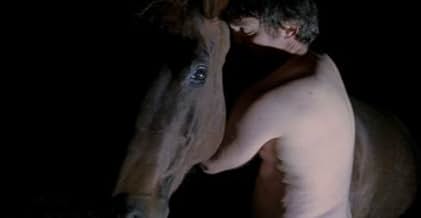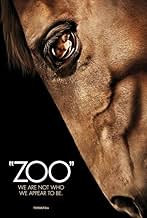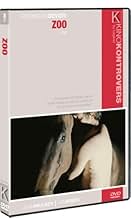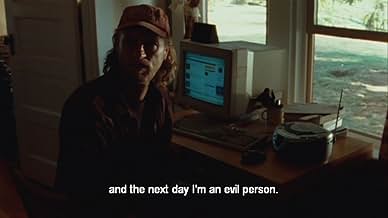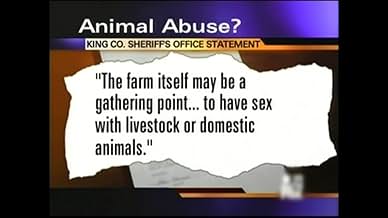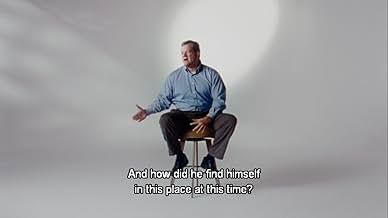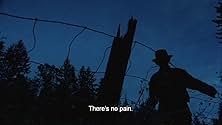IMDb-BEWERTUNG
5,5/10
3062
IHRE BEWERTUNG
Ein Blick auf das Leben eines Mannes aus Enumclaw, Washington, der an den Folgen einer ungewöhnlichen Begegnung mit einem Pferd starb.Ein Blick auf das Leben eines Mannes aus Enumclaw, Washington, der an den Folgen einer ungewöhnlichen Begegnung mit einem Pferd starb.Ein Blick auf das Leben eines Mannes aus Enumclaw, Washington, der an den Folgen einer ungewöhnlichen Begegnung mit einem Pferd starb.
- Regie
- Drehbuch
- Hauptbesetzung
- Auszeichnungen
- 1 Gewinn & 5 Nominierungen insgesamt
Forest Fousel
- Capitol Hill Man
- (as Forest L. Fousel)
Andrew Scott McIntyre
- Military Man
- (as Andrew McIntyre)
Michael J. Minard
- Cop #1
- (as Michael Minard)
Empfohlene Bewertungen
I am puzzled to find so many comments that are positive about this. To describe something so grotesque as "beautiful." I remember hearing something about the actual incident but I had always written it off as urban legend. Now I find that they made a documentary about it. I love documentaries but to make one about the rape of defenseless animals is beyond reprehensible. I tried to find more information on the internet about the actual incident but could find less information than about the movie they made about it. I had never even heard of this movie until now. This is rape people. Not natural in the least. I don't see how anyone is anything but repulsed by this.
Actors silently recreate controversial true-life events which took place in Washington State near Puget Sound when a family man died a shameful, incomprehensible death: he successfully managed to get a horse to have sex with him, resulting in internal injuries. Called zoophilia, this act of sexually bonding with an animal not of the human variety is the basis for this entire production and yet is tiptoed around in a most facetious, irritating, and finally dreary manner. The audio interviews with actual persons connected to this story fail to flesh out the narrative, what with clueless lines such as: "These were animals I loved. I wasn't breaking any laws." True, at that time, Washington did not have laws on the books regarding bestiality (which has since been rectified), but we are never made to understand this obsession. This "classless society" of men is envisioned here as members of a secretive sect (mysteriously filmed), and what we hear on the soundtrack are the murmurings of troubled and regretful lost souls. The swooping, gliding cinematography is handsome, but only serves to make the overall effect rather drowsy. The subject matter, though wanly dissected, isn't for the faint of heart...but if you're going to do a documentary-styled take on a small circle of zoophiliacs, you might want to figure out in advance what point you want to make. Director and co-writer Robinson Devor obviously didn't want to venture too far out into unchartered cinematic waters, yet his hesitance is much more of a turn-off than his theme. *1/2 from ****
Zoo is not a docudrama about caging animals but about having sex with them. The film, directed by Robinson Devor, comes out of an incident in 2005 in Enumclaw Washington, a rural community 45 miles southeast of Seattle in which a Boeing engineer died as a result of a perforated colon after having anal intercourse with an Arabian stallion. Known only as Mr. Hands in the film, the deceased man was a divorced father of a young son with a top level job who used his weekends as an escape from a suffocating life style. Since Washington law at the time allowed sex with animals, no one was charged with a crime.
While few object to depriving animals of their freedom in zoos or sending them to slaughterhouses to be ground up for hamburgers, the thought of men having sex with animals stirs up reservoirs of righteous indignation and the incident became fodder for the media and Internet message boards which approached it with typical scorn and ridicule. Devor uses a combination of audio interviews with actual participants and reenactments from actor stand-ins to attempt to shed some light on what actually happened. The film delivers neither judgment of the practice nor evaluation of the psychology behind it but simply raises the question whether zoophilia is simply another form of sexual orientation or whether it constitutes abuse of a being incapable of giving consent.
Shot in muted colors, Zoo has a lyrical and poetic style with a moving sound track that gives the film an air of something forbidden but also something eerily beautiful. Bringing a taboo subject out of the darkness and subjecting it to some light, the film allows us to reexamine our preconceived notions about a practice that has in fact been going on since Ancient Greece. Opening with an interview with Coyote, a coal miner from Virginia who came to Washington to meet like minded friends, the film examines the phenomenon of the "zoophile" community, a group of isolated individuals where such appetites are shared. The men gather at all night parties, talk about their love for animals, and engage in an activity they consider natural but which the rest of the world frowns upon. After he was identified as a participant, one man asks how he could be a good man yesterday and a bad man today but the question remains unanswered.
We hear the voices of some of the members of the group but only Jenny Edwards of the organization "Hope for Horses" speaks directly to the camera. While the thrust of her remarks are humane, her participation in a dramatization of the gelding of the horse involved is disturbing and is certainly done without the horses consent. Zoo neither endorses sex with animals nor condemns it but simply empathizes with the humanity of the participants who, for one reason or another, prefer anonymous sex as Richard Gere put it in Pretty Woman, "without all the emotional hassles" of relationships. By doing so, the issue is removed from the level of abstraction and the death is made heartbreakingly real.
While few object to depriving animals of their freedom in zoos or sending them to slaughterhouses to be ground up for hamburgers, the thought of men having sex with animals stirs up reservoirs of righteous indignation and the incident became fodder for the media and Internet message boards which approached it with typical scorn and ridicule. Devor uses a combination of audio interviews with actual participants and reenactments from actor stand-ins to attempt to shed some light on what actually happened. The film delivers neither judgment of the practice nor evaluation of the psychology behind it but simply raises the question whether zoophilia is simply another form of sexual orientation or whether it constitutes abuse of a being incapable of giving consent.
Shot in muted colors, Zoo has a lyrical and poetic style with a moving sound track that gives the film an air of something forbidden but also something eerily beautiful. Bringing a taboo subject out of the darkness and subjecting it to some light, the film allows us to reexamine our preconceived notions about a practice that has in fact been going on since Ancient Greece. Opening with an interview with Coyote, a coal miner from Virginia who came to Washington to meet like minded friends, the film examines the phenomenon of the "zoophile" community, a group of isolated individuals where such appetites are shared. The men gather at all night parties, talk about their love for animals, and engage in an activity they consider natural but which the rest of the world frowns upon. After he was identified as a participant, one man asks how he could be a good man yesterday and a bad man today but the question remains unanswered.
We hear the voices of some of the members of the group but only Jenny Edwards of the organization "Hope for Horses" speaks directly to the camera. While the thrust of her remarks are humane, her participation in a dramatization of the gelding of the horse involved is disturbing and is certainly done without the horses consent. Zoo neither endorses sex with animals nor condemns it but simply empathizes with the humanity of the participants who, for one reason or another, prefer anonymous sex as Richard Gere put it in Pretty Woman, "without all the emotional hassles" of relationships. By doing so, the issue is removed from the level of abstraction and the death is made heartbreakingly real.
Aside from the cinematography, which is outstanding, this documentary is not worth watching. The subject obsession is incomprehensible, if not reprehensible. While I can certainly feel compassion for the man's family, I can only shake my head at what he subjected himself to, time and time again. What can a man be thinking to allow a half ton animal to mount him and shove its two foot long penis into him?? For those of you who are tempted to download and watch the actual footage of the featured encounter (which is flashed briefly a few times in the film itself) my advice to you is don't. I have to admit that I allowed my curiosity to get away with me. Now I wish I could unwatch it.
Based on the case of a Boeing employee who died from a perforated colon while being anally penetrated by a horse in Enumclaw, a town in rural Washington state, "Zoo" (the term is short for zoophilia, the sexual love of animals) is a brave attempt to address a highly controversial and polarising issue in a dispassionate way that neither condemns nor sympathises with the people involved in bestiality. The film recreates the events leading up to the man's death and its aftermath in a way that's part documentary / part drama with re-enactments of scenes and emphasising a soft, dream-like mood with delicately muted, wafting music. Director Devor uses four narrators, talking to an unseen listener, to retell the events from the point of view of the people who knew the man, referred to in the film as "Mr Hands", and this approach thrusts (um) the viewer right into the twilight world of zoophiles: how they found each other through Internet contacts, how they organised their tryst and their reactions when the man was injured and when their secret activities became known to the outside world.
The film has the air of a noir mystery: the majority of scenes are filmed in shadow, at night or in dark colours with blue being predominant. The story unfolds slowly and elliptically and anyone who is unaware in advance as to what the film is about may be puzzled at the indirect way "Zoo" tiptoes around the subject until near half-way when a news report drops its headline in deadpan style. The pace is very steady, perhaps too steady and slow, and the film often dwells on several still camera shots which look deliberately staged as if for static display purposes. Close-ups and landscapes often look very abstract with washes of blue across a background; an orchard looks like a misty fairyland beneath a light coating of rain. The mood is even and quite blank until a scene in which police investigators viewing a DVD recording appears; the police react with horror and shock watching the act of buggery and only then do viewers feel something creepy crawl up their spines.
For all its delicacy, "Zoo" gives the impression of something much bigger than its subject matter struggling to make itself seen and heard: the zoophiles give the impression of wanting companionship, a sense of belonging, a need to share something special that gives meaning to their lives, and thinking they have found it. They seek a utopia in which everyone is equal and no-one is judged by how much money s/he earns or how educated s/he is. The places in rural Washington where many of them live look impoverished and some zoophiles may well be drifters or marginalised people barely managing to make a living and survive. (Difficult to tell as many scenes are recreations of actual events with actors playing the zoophiles.) If the film had directly addressed the need of the zoophiles for meaning, for companionship, it might have been able to gain more co-operation from the people involved; as it is, the level of co-operation it got is very restricted. The dead man's family refused to be interviewed for the film which is a pity as the wife and child might have presented him as more well-rounded than he appears in "Zoo".
The film also suffers from subjectivity and could have done with a more objective view of its subject. Interviews with psychologists and psychiatrists on zoophilia and perhaps other conditions such as lycanthropy (identifying oneself as an animal rather than as a human) might have shed light on why some people are sexually attracted to animals and to some kinds of animals in particular. The goals of the project would still be met: the issue would not be sensationalised and viewers might come away with a greater understanding of zoophilia and other bizarre philias. Instead the film can only concentrate on the horse-trainer, Jenny Edwards, who took charge of the horses after the incident became public: she admits that after having followed the case in its detail and ordering one of the horses gelded, that she's "on the edge" of understanding the zoophiles' obsession. It appears also that the director and film-crew were as much in the dark as Edwards was while making the film; even after its completion, the film-makers still were scratching their heads trying to make sense of what they'd done. Not a good portent for a film.
Yes, zoophilia is a difficult subject to talk about, let alone film, without making it look disgusting, degraded or ridiculous and pathetic. "Zoo" tries hard not to take one side or the other but with a subject like this, the attempt to be "balanced" is a tough act indeed to pull off. Some viewers will be irate that the film advocates no position at all, as if it's the film-makers' duty to tell them what they must believe. I think though that to achieve the "balance" that "Zoo" strives for, the film-makers should have pulled back from their subjects and taken a more generalised view of the issue of zoophilia; the police officers, the courts, psychologists and medical who dealt with the dead man and his friends should have been consulted for their opinions about zoophilia.
The film has the air of a noir mystery: the majority of scenes are filmed in shadow, at night or in dark colours with blue being predominant. The story unfolds slowly and elliptically and anyone who is unaware in advance as to what the film is about may be puzzled at the indirect way "Zoo" tiptoes around the subject until near half-way when a news report drops its headline in deadpan style. The pace is very steady, perhaps too steady and slow, and the film often dwells on several still camera shots which look deliberately staged as if for static display purposes. Close-ups and landscapes often look very abstract with washes of blue across a background; an orchard looks like a misty fairyland beneath a light coating of rain. The mood is even and quite blank until a scene in which police investigators viewing a DVD recording appears; the police react with horror and shock watching the act of buggery and only then do viewers feel something creepy crawl up their spines.
For all its delicacy, "Zoo" gives the impression of something much bigger than its subject matter struggling to make itself seen and heard: the zoophiles give the impression of wanting companionship, a sense of belonging, a need to share something special that gives meaning to their lives, and thinking they have found it. They seek a utopia in which everyone is equal and no-one is judged by how much money s/he earns or how educated s/he is. The places in rural Washington where many of them live look impoverished and some zoophiles may well be drifters or marginalised people barely managing to make a living and survive. (Difficult to tell as many scenes are recreations of actual events with actors playing the zoophiles.) If the film had directly addressed the need of the zoophiles for meaning, for companionship, it might have been able to gain more co-operation from the people involved; as it is, the level of co-operation it got is very restricted. The dead man's family refused to be interviewed for the film which is a pity as the wife and child might have presented him as more well-rounded than he appears in "Zoo".
The film also suffers from subjectivity and could have done with a more objective view of its subject. Interviews with psychologists and psychiatrists on zoophilia and perhaps other conditions such as lycanthropy (identifying oneself as an animal rather than as a human) might have shed light on why some people are sexually attracted to animals and to some kinds of animals in particular. The goals of the project would still be met: the issue would not be sensationalised and viewers might come away with a greater understanding of zoophilia and other bizarre philias. Instead the film can only concentrate on the horse-trainer, Jenny Edwards, who took charge of the horses after the incident became public: she admits that after having followed the case in its detail and ordering one of the horses gelded, that she's "on the edge" of understanding the zoophiles' obsession. It appears also that the director and film-crew were as much in the dark as Edwards was while making the film; even after its completion, the film-makers still were scratching their heads trying to make sense of what they'd done. Not a good portent for a film.
Yes, zoophilia is a difficult subject to talk about, let alone film, without making it look disgusting, degraded or ridiculous and pathetic. "Zoo" tries hard not to take one side or the other but with a subject like this, the attempt to be "balanced" is a tough act indeed to pull off. Some viewers will be irate that the film advocates no position at all, as if it's the film-makers' duty to tell them what they must believe. I think though that to achieve the "balance" that "Zoo" strives for, the film-makers should have pulled back from their subjects and taken a more generalised view of the issue of zoophilia; the police officers, the courts, psychologists and medical who dealt with the dead man and his friends should have been consulted for their opinions about zoophilia.
Wusstest du schon
- WissenswertesThe horse performer in this movie was a Thoroughbred mare named 'Somebodys Baby', and is a former successful racehorse. The horse in the incident portrayed was in reality an Arabian stallion.
- VerbindungenFeatured in Aristokraticheskiy kinematograf: Folge #1.9 (2011)
Top-Auswahl
Melde dich zum Bewerten an und greife auf die Watchlist für personalisierte Empfehlungen zu.
- How long is Zoo?Powered by Alexa
Details
Box Office
- Bruttoertrag in den USA und Kanada
- 69.770 $
- Eröffnungswochenende in den USA und in Kanada
- 7.811 $
- 29. Apr. 2007
- Weltweiter Bruttoertrag
- 69.770 $
- Laufzeit1 Stunde 15 Minuten
- Farbe
- Seitenverhältnis
- 1.78 : 1
Zu dieser Seite beitragen
Bearbeitung vorschlagen oder fehlenden Inhalt hinzufügen


